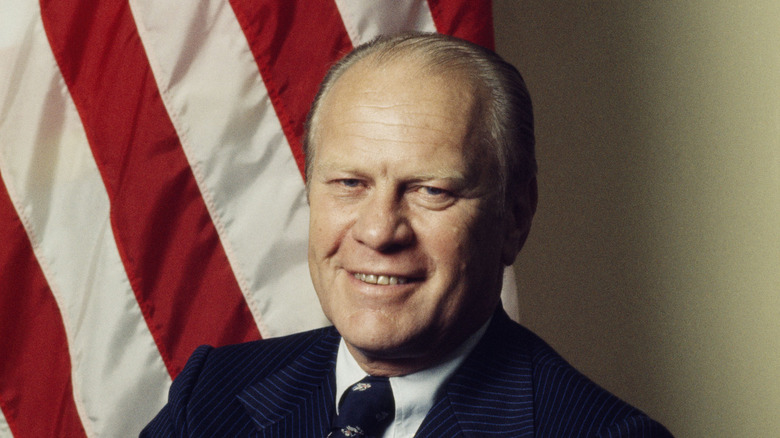During his presidency, America withdrew its troops from Vietnam: Who is Gerald Rudolph Ford Jr?
38. President of the United States, politician. He is the only president in American history to have served as both vice president and president without being elected.

Born on July 14, 1913, in Omaha, Nebraska, USA, Ford changed his real name from Leslie Lynch King, Jr., to the name of his stepfather, Gerald Rudolph Ford, after his mother's second marriage.
Ford, who started his economics education at the University of Michigan, graduated from Yale University, Faculty of Law in 1941. Ford, who was admitted to the Michigan Bar Association in the same year, practiced law in the short period after the attack on Pearl Harbor on December 7, until he joined the American Navy. Ford, who participated in the war in the ranks of the US Navy, was awarded the nine-star Asia Pacific Mission Medal for his achievements in the wars in the Pacific Ocean region. After the war, he married Betty Ford on October 15, 1948.
Gerald Rudolph Ford Jr. (July 14, 1913 – December 26, 2006) was an American politician who served as the 38th president of the United States from 1974 to 1977. He previously served as the leader of the Republican Party in the U.S. House of Representatives from 1965 to 1973, and as the 40th vice president under President Richard Nixon from 1973 to 1974. Ford succeeded to the presidency when Nixon resigned in 1974, but was defeated for election to a full term in 1976. Ford is the only person to become U.S. president without winning an election for president or vice president.
Ford, who gained his first political position in 1949 when he was accepted among the Republicans in the White House, served as Michigan representative for 13 terms. During his time in Congress, Ford served on many committees, including the Warren Committee, which investigated the assassination of President John F. Kennedy, and was the leader of the opposition in the White House from 1965 to 1973.
Ford, who had a reputation as a staunch Republican, stood behind his party on almost every issue. A consistent advocate of the need for a large defense budget, Ford led opposition to President Lyndon Johnson's community programs. He served as a director at the National Republican Congress between 1968 and 1972.
The political scandals of the 1970s also changed the course of Ford's political career. In late 1973, after Vice President Spiro Agnew was ousted from office, Nixon selected him as the new vice president. Ford, who took office on December 6, 1973, toured the country and worked on behalf of the Nixon administration. Then, in August 1974, Nixon resigned from the presidency due to his involvement in the Watergate scandal.
On August 9, 1974, Gerald R Ford became the 38th President of the United States.
Ford drew the reaction of the American people by granting a presidential pardon to Nixon, who resigned a month after taking office. As a result of this amnesty, Nixon couldn't be tried for the corruption he was accused of. During the presidency of Gerald Ford, who received much criticism for this decision, economic difficulties began to emerge.
During the Ford era, America withdrew its troops from Vietnam. Continuing Nixon's foreign policy in international relations, Ford made various visits to Asia and Europe. Ford, who painted a moderate portrait and tried to restructure relations with the Soviet Union, also made attempts to reduce the tension in the Middle East.
In the 1974 elections, Republicans suffered significant injuries due to economic uncertainty and the Watergate scandal.
In 1975, many of Ford's ideas to deal with the economic crisis, such as tax reduction, limited consumption, and a heavy tax on imported gasoline, were opposed by the Democratic Congress.
Ford, who was defeated by Democratic candidate Jimmy Carter in the 1976 elections, ended his political career in 1977.
The book A Time to Heal, in which Ford wrote his memoirs after his presidency, was published in 1979.
During his retirement, Ford attended conferences and symposiums, served on the boards of companies and charitable foundations, and wrote articles. He continued in the tradition of other retired American presidents and built a Presidential Library in Grand Rapids, opening it in 1981.
Ford, who had two heart attacks in 2000, recovered quickly. However, the former president, whose health problems recurred towards the end of 2005, was hospitalized for some tests. From then on, he began to be treated for pneumonia and shortness of breath. Ford, who had an angioplasty operation and a pacemaker inserted into his heart in 2006, became the longest-living former president in US history on November 12, 2006.
Gerald Rudolph Ford died on December 26, 2006, at the age of 93.
In his letter, which he wished to be opened after his death, Ford criticized George W Bush's Iraq policy and stated that the Iraq war was wrong.
